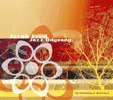Jacob Fred Jazz Odyssey - The Sameness of Difference

 Jacob Fred Jazz Odyssey - The Sameness of Difference
Jacob Fred Jazz Odyssey - The Sameness of Difference(CD) Hyena Records HYN9343, 2005-10-11
Tracklisting :
01. Have You Ever Been To Electric Ladyland
02. Slow Breath, Silent Mind
03. Isobel
04. The Maestro
05. Santiago
06. Fables of Faubus
07. The Spark That Bled
08. Don't Let It Bring You Down
09. In Your Own Sweet Way
10. Davey's Purple Powerline
11. Halliburton Breakdown
12. Wonderful
13. Happiness Is A Warm Gun | MP3 sample
Note : pre-orders were granted a free bonus CD "Improvisations For The Ghost"
Links :
jfjo.com (official site)
myspace.com/jacobfredjazzodyssey
hyenarecords.com
myspace.com/hyenatherecordlabel
brianroyhaas.com
myspace.com/brianhaas
myspace.com/jahsmart
myspace.com/httpwwwmyspacecomreedmathis
JFJO on YouTube
Jacob Fred Jazz Odyssey on YouTube
Download JFJO live shows
Watch JFJO live shows
Press Release :
Jacob Fred Jazz Odyssey return on October 11, 2005 with their brand new studio album, The Sameness of Difference, on HYENA Records. Recorded in collaboration with acclaimed record producer, Joel Dorn, the 13-track collection is a living, breathing, pulsating testament to the 12 years that the trio has spent together. It is unquestionably the Jacob Fred Jazz Odyssey's piece de resistance—a post-modern jazz masterwork. Throughout the album, the band explores their influences, which stretch from cutting edge indie rock to experimental electronic music to classic pop, all the while rooted in an obsession with the modern jazz canon. They offer interpretations of music by Bjork, The Flaming Lips, Charles Mingus, Neil Young, Brian Wilson, Dave Brubeck, The Beatles and Jimi Hendrix. Their own material is also well represented, as original compositions, "Santiago," "The Maestro," "Halliburton Breakdown," "Slow Breath, Silent Mind" and "Davey's Purple Powerline" are etched in stone for the first time ever in the studio.
"The Sameness of Difference was honestly a joy to make. We've never been so unrestricted before in the creative process," states bassist Reed Mathis. "All the way from conception to completion, every aspect of the project flowed. It seemed to create itself as we went along. Anybody who's ever made a record knows how rare it is to achieve that kind of flow."
The Sameness of Difference was recorded at Sear Sound in New York City. Although the Jacob Fred Jazz Odyssey was originally scheduled for three full days of recording, they tracked the album's entire repertoire in one marathon session. It should be noted that this included a two hour break to retrieve their van from the New York City pound after it was towed earlier in the day. As always, it was the group's complete and utter commitment to improvisation and creating in the moment that served as their most reliable muse. And it's in the lineage and spirit of the countless classic jazz records that were recorded in a day's time that The Sameness of Difference resides.
"We have about 13 records that we've made, but this is the first time I have actually witnessed a record making itself," declares pianist Brian Haas. "We were lucky enough to have Joel Dorn producing the session and Gene Paul engineering the session. Their old school energy balanced out our new school approach, and by the end of the first day in the studio, the record was done! Joel said he hadn't made a record like that since the last Rahsaan Roland Kirk album!"
Producer Joel Dorn, whose resume includes jazz giants such as Rahsaan Roland Kirk, Charles Mingus, Keith Jarrett and Yusef Lateef, first became enamored with the Jacob Fred Jazz Odyssey after having seen them perform a version of the standard "Alone Together" at New York City's revered jazz room, Tonic, in 2004. At this point, the trio had already released the critically acclaimed, Walking With Giants, on HYENA. Shortly thereafter, Dorn suggested that the group consider the possibility of recording an album's worth of jazz standards. The idea clicked, but quickly grew to include choosing material from a broadly based spectrum of artists and genres with the sole stipulation being that it had to have inspired the trio's collective musical voice.
"The first time I saw them it immediately struck me how high the group's level of musicianship was, their interaction was so tight and precise," states Joel Dorn. "They're creating music that's completely modern, but at the same time it has those very qualities that appealed to me in the work of artists like Charles Lloyd and Keith Jarrett."
On The Sameness of Difference, the Jacob Fred Jazz Odyssey showcases a telepathic group mind. It's the evolution of an ongoing musical conversation that's been developed over countless tours, but never quite captured as powerfully on their studio records before. Unlike most trios where the bass and drums comprise the rhythm section, JFJO's pianist Brian Haas and drummer Jason Smart often fill this role, while bassist Reed Mathis, regarded as one of the most visionary bass players in improvisational music, renders the lead melody. On the Hendrix anthem, "Have You Ever Been To Electric Ladyland," Mathis wails mystically atop of a delicate foundation established by Haas and Smart. On Bjork's "Isobel," the group achieves what might be one of their most evocative performances on record thus far. Slowly, steadily, rising Phoenix-like, soaring and sailing, touching down in gentle patterns before leaving the stratosphere all together. Mathis' violin-like passages fully evoke the power of Bjork's lyric.
A sinewy rendition of Mingus' venerable "Fables of Faubus" finds Brian Haas at the center of the storm as he introduces the melody with an understated aplomb, only to slowly and subversively twist and unravel its core in a myriad of directions. Conversely, JFJO's rendition of The Flaming Lips' "The Spark That Bled" is reverent, yet builds to an epic roar that's far too rare in modern jazz. It's perhaps best described as the jazz equivalent of the power trio. The band immediately follows with the sweeping majesty of Neil Young's "Don't Let It Bring You Down." They conclude this grouping with Dave Brubeck's "In Your Own Sweet Way," a fanciful interpretation that finds Haas at his most elegant and restrained, while Jason Smart lays down a crisp, contemporaneous groove.
"This is a much more relaxed and user-friendly version of the band," states drummer Jason Smart. "We used to be intentionally jagged and avant-garde, but now we're able to say more with less and in the process bring a wider audience into the fold. In my mind, it's a much higher and more evolved form of expression."
The dichotomy of the material included on The Sameness of Difference, and the group's ability to reinvent such a varied repertoire in an endless array of colors and emotions is consistently engaging. It also hints at one possible explanation of the album's title. But while outside material comprises much of the album, JFJO's own compositions hardly take a back seat. "The Maestro," with its instantly identifiable head figure, opens flower-like in a spiraling jam centered on Brian Haas and Jason Smart's symbiotic counterpoint. The high energy JFJO fan-favorite, "Santiago," is best known as an electric piece, but here it's rendered in a subtlety tweaked acoustic treatment. "Slow Breath, Silent Mind," true to its title, is meditative and marked by grandeur that's wholly beautiful in its sum. Rounding out JFJO's own material is the simultaneously serrated and flowing "Davey's Purple Powerline" and the rollicking political indictment, "Halliburton Breakdown."
The Jacob Fred Jazz Odyssey performed over 100 dates in 2005, including a tour as the opening act for Les Claypool, appearances at high profile festivals such as the JVC Jazz Festival, High Sierra Festival, 10,000 Lakes Festival and the Iowa City Jazz Festival and numerous headline shows from New York City to San Francisco. They were also voted the No. 2 “Rising Star Electric Jazz Group” in DownBeat’s 2005 Critics Poll. They recently made their concert debuts in South America and Europe. And if an endless tour schedule and the recording of a brand new studio album wasn’t enough, individually Brian Haas released his debut solo piano album, The Truth About Hollywood, while Reed Mathis joined the Steve Kimock Band as an official member and Jason Smart toured as the drummer in Robert Walter's 20th Congress. With the release of The Sameness of Difference, Jacob Fred Jazz Odyssey are primed to begin a new and undoubtedly exciting chapter in their ever evolving odyssey.